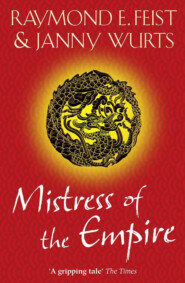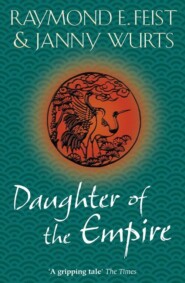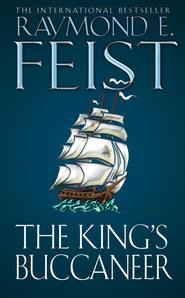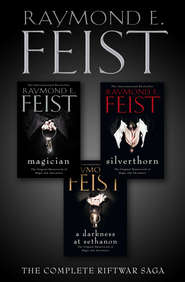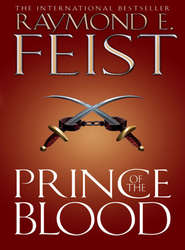По всем вопросам обращайтесь на: info@litportal.ru
(©) 2003-2025.
✖
The Serpentwar Saga: The Complete 4-Book Collection
Автор
Год написания книги
2018
Настройки чтения
Размер шрифта
Высота строк
Поля
Maps (#ulink_53f07d5b-2220-5392-bc47-f33141424c8b)
Book One Erik’s Tale (#ulink_517039c4-7775-5ea4-b1e7-064c6a65d04a)
Days, when the ball of our vision
Had eagles that flew unabashed to sun;
When the grasp on the bow was decision.
And arrow and hand and eye were one;
When the Pleasures, like waves to a swimmer,
Came heaving for rapture ahead! –
Invoke them, they dwindle, they glimmer
As lights over mounds of the dead.
– George Meredith
‘Ode to Youth in Memory’
• Prologue • Deliverance (#ulink_3f907b62-7032-58ec-8dc6-edfbb5ca6e8a)
The drums thundered.
Warriors of the Saaur sang their battle chants, preparing for the struggle to come. Tattered war banners hung limply from bloodied lances as thick smoke shrouded the sky from horizon to horizon. Green faces marked with yellow and red paint watched the western skies, where fires cast crimson and ocher light against the black shroud of smoke, blocking the vanishing sun and the familiar tapestry of the western evening stars.
Jarwa, Sha-shahan of the Seven Nations, Ruler of the Empire of Grass, Lord of the Nine Oceans, could not tear his gaze away from the destruction. All day he had watched the great fires burn, and even across the vast distance the howls of the victors and the cries of their victims had carried through the afternoon. Winds that once carried the sweet scent of flowers or the rich aroma of spices from the market now carried the acrid stench of charred wood and burned flesh. He knew without looking that those behind were bracing for the coming trial, resigned in their hearts that the battle was lost and the race would die.
‘My lord,’ said Kaba, his Shieldbearer and lifelong companion.
Jarwa turned to his oldest friend and saw the concern etched faintly around his eyes. Kaba was an unreadable mask to all but Jarwa; the Sha-shahan could read him as a shaman reads a lore scroll. ‘What is it?’
‘The Pantathian is here.’
Jarwa nodded, but he remained motionless. Powerful hands closed in frustration over the hilt of his battle-sword, Tual-masok – Blood Drinker in the ancient tongue – far more a symbol of office than the crown he had worn only on rare state occasions. He pushed its point down into the soil of his beloved Tabar, the oldest nation on the world of Shila. For seventeen years he had fought the invaders as they had driven his hordes back to the heartland of the Empire of Grass.
When he had taken the sword of the Sha-shahan while still a youth, warriors of Saaur had passed in review, filling the ancient stone causeway that spanned the Takador Narrows, the channel connecting the Takador Sea and the Castak Ocean. One hundred riders – a century – side by side, rode past, one hundred centuries to a jatar: ten thousand warriors. Ten jatar to a host, and ten host to a horde. At the height of his power, seven hordes answered Jarwa’s battle horns, seven million warriors. Always on the move, their horses grazed the Empire of Grass, while children grew to adulthood playing and fighting among the ancient wagons and tents of the Saaur, stretching from the city of Cibul to the farthest frontier, ten thousand miles distant; it was an empire so vast that teams of horses and riders, never stopping their gallop, would take a full turning of the moon and half again to ride from the capital to the frontier, twice that from one border to the other.
Each season, one horde rested near the capital, while the others moved along the frontiers of the great nation, ensuring the peace by conquering all who refused tribute. Along the shores of the nine great oceans, a thousand cities sent food, riches, and slaves to the court of the Sha-shahan. And once a ten-year, the champions of the seven hordes gathered for the great games at Cibul, ancient capital of the Empire of Grass. Over the span of centuries. the Saaur had gathered all of Shila under the Sha-shahan’s banner, all but the most distant nations on the far side of the world. It was Jarwa’s dream to be the Sha-shahan who at last realized the dream of his ancestors, to bring the last city into the Empire and rule the entire world.
Four great cities had fallen to Jarwa’s hordes, and another five had surrendered without a struggle, leaving fewer than a dozen outside the Empire. Then the riders of the Patha Horde had come to the gates of Ahsart, City of Priests. Soon disaster followed.
Jarwa steeled himself against the sounds of agony that carried through the twilight. The cries were of his people as they were led to the feasting pits. From what those few able to escape had said, the captives who were quickly slaughtered were perhaps the fortunate ones, along with those who had fallen in battle. The invaders, it was said, could capture the souls of the dying, to keep them as playthings, tormenting them for eternity as the shades of the slain were denied their final place among their ancestors, riding in the ranks of the Heavenly Horde.
Jarwa looked down upon the ancient home of his people from his vantage atop the plateau. Here, less than a half day’s ride from Cibul, the ragged remnants of his once-mighty army camped. Even in this the darkest hour of the Empire of Grass, the presence of the Sha-shahan caused his warriors to stand tall, throw back their heads, and look toward the distant enemy with contempt. But no matter the posture of these warriors, their Sha-shahan saw something in their eyes no Lord of the Nine Oceans had ever seen before in the countenance of a Saaur warrior: fear.
Jarwa sighed, and turned without words to return to his tent. Knowing full well that no choice was left, still he hated to face the alien. Pausing before his own tent, Jarwa said, ‘Kaba, I have no faith in this priest from another world.’ He spit the word.
Kaba nodded, his scales grey from years of the hard life on horseback and from serving his Sha-shahan. ‘I know you have doubts, my lord. But your Cupbearer and your Loremaster concur. We have no choice.’
‘There is always a choice,’ whispered Jarwa. ‘We can choose to die like warriors!’
Softly Kaba reached out and touched Jarwa on the arm, a familiarity that would have brought instant death to any other warrior of the Saaur. ‘Old friend,’ he said softly, ‘this priest offers our children haven. We can fight and die, and let bitter winds sing away the memory of the Saaur. There will be no one left to chant remembrance to the Heavenly Horde of our valor, while fiends eat our flesh. Or we may send our remaining females and the young males to safety. Is there another choice?’
‘But he is not like us.’
Kaba sighed. ‘There is something …’
‘This one’s blood is cold,’ whispered Jarwa.
Kaba made a sign. ‘The cold-blooded are creatures of legend.’
‘And what of those?’ asked Jarwa, motioning to the distant fire engulfing his capital.
Kaba could only shrug. Saying nothing more, Jarwa led his oldest friend into the Sha-shahan’s tent.
The tent was larger than any other in camp, in reality a pavilion of many tents sewn together. Glancing around the interior, Jarwa felt cold grip his heart. So many of his wisest advisers and his most powerful loremasters were missing. Yet of those who remained, all looked to him with hope. He was Sha-shahan, and it was his duty to deliver the people.
Then his eyes fell upon the alien, and again he wondered which choice was wiser. The creature looked much like the Saaur, green scales covering arms and face, but he wore a deep-hooded robe that concealed the body, rather than the armor of a warrior or robes of a loremaster. He was small by Saaur standards, being less than two arms’ span in height, and his snout was too long by half, and his eyes were all black, rather than red iris upon white as were the eyes of the Saaur. Where thick white nails should have been, black talons extended from his fingers. And his speech contained a sibilance, from the tongue that forked. As he removed his battered helm from his head and handed it to a servant, Jarwa voiced aloud what every warrior and loremaster in the tent thought: ‘Snake.’
The creature bowed his head, as if this were a greeting instead of a deadly insult. ‘Yes, my lord,’ it hissed in return.
Several of Jarwa’s warriors had hands upon weapons, but the old Cupbearer, second only to Kaba in importance to his lord, said, ‘He is our guest.’
Long had the legends of the snake people been with the Saaur, the lizard people of Shila. Like the hot-blooded Saaur, yet not, they were creatures invoked by mothers to frighten naughty children at night. Eaters of their own kind, laying eggs in hot pools, the snake people were feared and hated with racial passion though none had been seen in the longest memory of the loremasters of the Saaur. In the legend it was said that both races were created by the Goddess, at the dawn of time, when the first riders of the Heavenly Horde were hatched. The servants of the Green Lady, Goddess of the Night, the snakes had remained in her mansion, while the Saaur had ridden forth with her and her god-brothers and god-sisters. Abandoned to this world by the Goddess, the Saaur had prospered, but always the memory of the others, the snakes, remained. Only the Loremaster knew which tales were history and which were myth, but one thing Jarwa knew: from birth, the Sha-shahan’s heir was taught that no snake was worthy of trust.
The snake priest said, ‘My lord, the portal is ready. Time grows short. Those feasting upon the bodies of your countrymen will tire of their sport, and as night deepens, and their powers grow, they will be here.’
Ignoring the priest for a moment, Jarwa turned to his companions and said, ‘How many jatar survive?’
Tasko, Shahan of the Watiri, answered. ‘Four and but a part of a fifth.’ With a note of finality in his voice, he said, ‘No jatar remains intact. These last are gathered from remnants of the Seven Hordes.’
Jarwa resisted the impulse to surrender to despair. Forty thousand riders and part of another ten thousand. That was all that survived from the Seven Great Hordes of the Saaur.
Jarwa felt blackness grip his heart. How he remembered his outrage when word came from the Patha Horde of the priests’ defiance and refusal to pay tribute. Jarwa had ridden for seven months to lead personally the final attack against Ahsart, City of Priests. For a moment he felt a stab of remorse cut deep into his soul; then he silently chided himself: could any ruler have known that the insane priests of Ahsart would destroy everything rather than let the Saaur unite the world under one ruler? It had been the mad high priest, Myta, who had unsealed the portal and let the first demon through. There was small comfort in knowing that the demon’s first act was to capture Myta’s soul for torment as he ripped his head from his body. One Ahsart survivor had claimed a hundred warrior priests had attacked the one demon as it devoured Myta’s flesh, and none had survived.
Ten thousand priests and loremasters alongside more than seven million warriors had died holding the foul creatures at bay as they battled from the farthest border of the Empire to its heart, in a war spanning half a world. A hundred thousand demons had died, but each one’s destruction was paid for in dear blood, as thousands of warriors threw themselves fearlessly at the hideous creatures. The loremasters had used their arts to good effect at times, but always the demons returned. For years the fighting had continued, a running battle past four of the nine oceans. Children had been born in the Sha-shahan’s camp, grown to young adulthood, and died in the fighting, and still the demons came. The loremasters looked in vain for a means of closing the portal and turning the tide of battle to the Saaur.
From the other side of the world they had fought their way back to Cibul, as the demon army poured through the portal between worlds, and now another portal was being opened, offering hope for the Saaur: hope through exile.
Kaba pointedly cleared his throat, and Jarwa forced away regret. Nothing would be gained from it; as his Shieldbearer had said, there was no choice.
‘Jatuk,’ Jarwa said, and a young warrior stepped forward. ‘Of seven sons, one to rule each horde, you are the last,’ he said bitterly. The young warrior said nothing. ‘You are Ja-shahan,’ pronounced Jarwa, officially naming him heir to the throne. The youth had joined his father but ten days before, riding out to his father’s camp accompanied by his personal retinue. He was but eighteen years of age, barely more than a year from the training grounds and a veteran of only three battles since coming to the front. Jarwa realized that his youngest son was a stranger, having been only a crawling infant when he had left to bring Ahsart to her knees. ‘Who rides to your left?’ he asked.
Jatuk said, ‘Monis, birth companion.’ He indicated a calm-looking young man who already bore a proud scar along his left arm.






